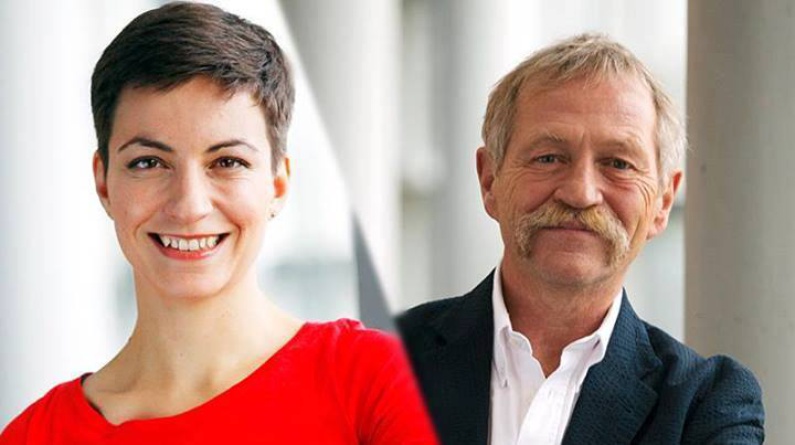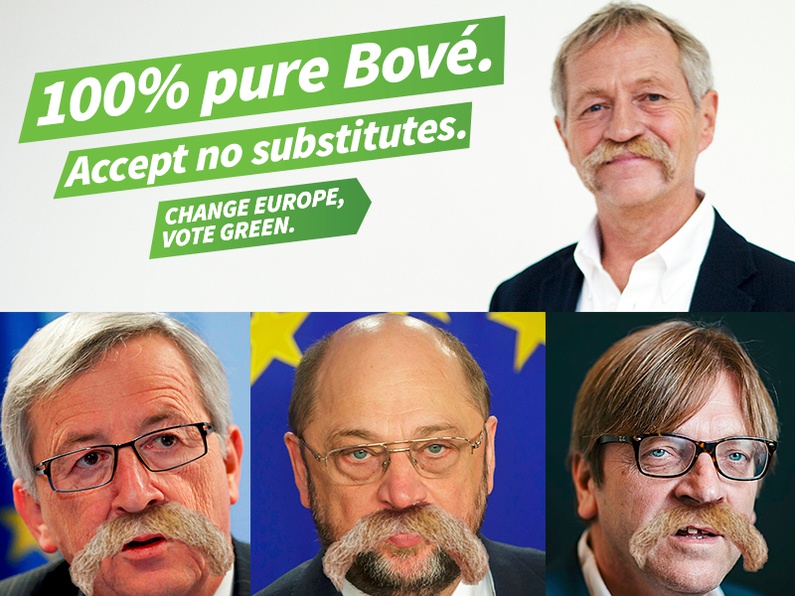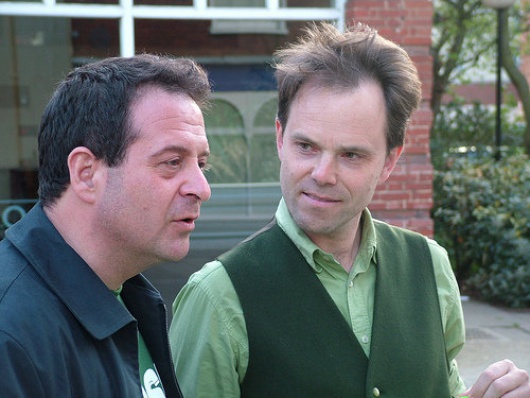
Green Party: We Need To Fight NeoLiberalism
Published on
With a few days to go before the European elections, xenophobic populists are grabbing all the headlines. Apparently they are cleaning up the "protest vote". But the Green Party offer reasonable, real and radical alternatives to the old school of European politics. Cafébabel spoke to Rupert Read, a philosopher at the University of East Anglia and Green Party candidate for the East of England.
Cafébabel: In other European countries, say Germany and France, the green parties are really strong; they have a much larger presence than in the UK. The European Greens are the fourth largest European alliance. Do you think that seeing the Greens so strong in Europe as a whole will start to make people in the UK take the UK Green Party more seriously and see the Green Party as a real political force?
Rupert Read: It’s a good question and the answer is yes. I’ve found that during this campaign, when people come to understand that our group in the European Parliament is larger than the group which contains the Conservative Party they realise that we are really serious players in Europe and in these elections. And also it’s helpful when you put that together with proportional representation as a system, which we don’t have in our general elections, but which we do have in the European elections. I think this is why the opinion polls show us moving into fourth place ahead of the Lib Dems with the potential for significantly increasing our number of seats at the election.
CB: What you think of the leadership of Ska Keller and José Bové?
RR: It’s added something to the campaign. I think it’s difficult because we still don’t have a real European public. We’re trying to create one. But I think it’s important we don’t drift too far towards federalism. In Britain the Greens are strongly behind the agenda of localisation and decentralisation and subsidiarity.
CB: In an interview Natalie Bennett said the other parties in the UK are trying to out-UKIP UKIP. What kind of impact on the wider debate about immigration have UKIP had?
RR: It has had a very negative effect. I was on television yesterday debating with Nigel Farage’s spin doctor, Patrick O’Flynn. I put it to him that when Farage says people have a right to be concerned when Romanians move in next door, things have reached a very dangerous point in this country. Imagine if Farage said people have a right to be concerned if Irish people move in next door, or if blacks move in next door or if Jews move in next door. UKIP is a xenophobic party. It often borders on racism. So we have to confront them very directly.
 CB: I’ve read some of your articles on growth fetishism and a post growth economy. Could you briefly outline what you mean by a post growth economy?
CB: I’ve read some of your articles on growth fetishism and a post growth economy. Could you briefly outline what you mean by a post growth economy?
RR: It’s simple really; a post growth economy is an economy in which there is not growth any more. A post-growth society is one in which people say, “Actually why do we need to keep pursuing growth? What is growth for? What do we actually need?” And what we actually need is good quality of life, security, all of our basic needs fulfilled, fairness, a more equal society.
CB: Do you think that using GDP growth as the primary measure of success and of wealth allows governments to ignore inequality and redistribution of wealth?
RR: Yes that’s precisely what I think. And I think that’s why it’s an especially bad idea for any party that considers themselves to be on the left to pursue a growthist agenda and of course it’s an essential flaw in socialism and social democracy over the last generation or so. We should pursue other measures aside from GDP to reflect what society really needs.
CB: In one of your articles you make the distinction between standard of living and quality of life. Can you explain what the distinction is and why it’s important?
 RR: Standard of living basically means physical things that can be measured. How many cars do you have? How much disposable income do you have? Whereas quality-of-life is actually about people’s levels of happiness, mental and physical health, things like that. The question is, which is more important? At the moment we primarily measure standard of living. My suggestion is we ought to seek to measure quality-of-life. What actually matters is not how much money one has or how many cars one has. What matters is whether one is well, whether one is secure, happy, peaceful and at ease. These should be the objectives of politicians.
RR: Standard of living basically means physical things that can be measured. How many cars do you have? How much disposable income do you have? Whereas quality-of-life is actually about people’s levels of happiness, mental and physical health, things like that. The question is, which is more important? At the moment we primarily measure standard of living. My suggestion is we ought to seek to measure quality-of-life. What actually matters is not how much money one has or how many cars one has. What matters is whether one is well, whether one is secure, happy, peaceful and at ease. These should be the objectives of politicians.
CB: Do you think that neoliberalism as an ideology is entrenched in the global economy and perpetuated by institutions like the IMF, the World Bank and the European Central bank? Do you think it’s a hegemony that can be overcome?
RR: Yes although it’s going to be very difficult. It’s going to take a big movement. The hegemony of neoliberalism is very widespread. It’s there in the EU. It is entrenched in the Lisbon Treaty. I think as Greens we have to be ready to be radical, and be ready to really challenge the foundational institutions of our time including the EU itself. We need to be challenging growth and growthism. We need to take seriously that what people need is not more stuff, or a trickle-down economy. We need to pursue a different ideology to neoliberalism and that’s ecologism. We need to fight neoliberalism explicitly. We need to name it and fight it.
CB: What are the Green Party’s policy priorities?
RR: We’ve been talking a lot about a green energy revolution, and a green transport revolution, taking renewables seriously and taking reduction of energy waste seriously, a massive insulation program rolled out by local authorities and by the state, which would pay for itself because you’d be reducing waste. A public transport revolution; taking the railways back into public hands, taking the buses back into public hands, safer streets, better facilities for cycling, and all of this instead of the current focus at Westminster and in Brussels on international and national mega projects, by road, rail and air. So having a localising effect as well as the effect of reducing carbon emissions- those are the two things I’ve been focusing on most.
 CB: Why are the Greens opposed to the Transatlantic Trade and Investment Partnership?
CB: Why are the Greens opposed to the Transatlantic Trade and Investment Partnership?
RR: Because the TTIP is a way of stripping out democracy and replacing it with corporate rule. It’s a race to the bottom in terms of international standards. The TTIP is a major threat to democracy and all the standards that we fought for for generations and that’s why the Greens oppose it.
CB: Do you think that the main parties, rather than trying to oppose UKIP, have almost assimilated some of their rhetoric and ideas?
RR: Yes. UKIP is moving the agenda to the right. UKIP is a hard-right, xenophobic, populist party. That’s why the Front National in France have reached out to them.
CB: Who’s your favourite European writer or philosopher?
RR: Wittgenstein from Austria, who is my main man really.



